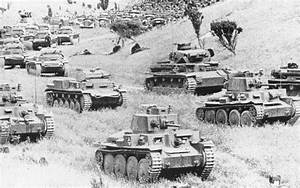Os primeiros anos da Segunda Guerra Mundial foram favoráveis ao Eixo (Alemanha, Itália e Japão), devido à estratégia denominada Blitzkrieg, que levou a rápidas ofensivas e vitórias nazistas sobre vários países europeus. A Blitzkrieg, também conhecida como guerra-relâmpago, nada mais era do que um ataque rápido e coordenado de tanques com ajuda de aviões.
A Blitzkrieg foi extremamente eficaz porque o inimigo era surpreendido com as tropas inimigas num combate onde não havia tempo de reação. Essa estratégia não foi usada somente nos campos de batalha, mas também em cidades, o que gerava um grande número de civis mortos.
Em pouco tempo os exércitos alemães ocuparam países como a Dinamarca, a Noruega, a Holanda e a Bélgica. Em julho de 1940 eles conseguiram derrotar a França e tomar Paris. No início de 1941 os nazistas bombardearam Londres, contudo não tiveram sucesso em tomar a cidade. No mesmo ano, a Alemanha invadiu a URSS, quebrando o pacto nazis soviético de não agressão, território no qual a blitzkrieg também não lograria o sucesso de até então. Era o início do fim da Segunda Guerra Mundial.
Blitzkrieg
The early years of the war were favorable to the Axis (Germany, Italy and Japan), that was featured for the fast attack and Nazi victory. That was for the Blitzkrieg, also known as lightning war, that was a coordinated fast attack with planes and war tanks.
The Blitzkrieg was extremely effective because the enemy was surprised by the many troops in combat, where they had no reaction time. That strategy was used in the battlefield and in cities, what caused the death of many civilians.
In a short time, German armies occupied countries such as Denmark, Norway, the Netherlands and Belgium. In July 1940 they managed to defeat France and take Paris. In early 1941 the Nazis bombed London, but were unsuccessful in taking the city. In the same year, Germany invaded the USSR, breaking the Soviet Nazi non-aggression pact, a territory in which the blitzkrieg would not have succeeded until then. It was the beginning of the end of World War II.
Christian Baba, Erick Trentin, Mateus Pizyblski, Matheus Becker, Pedro Billerbeck e Sergio Prusnei.

